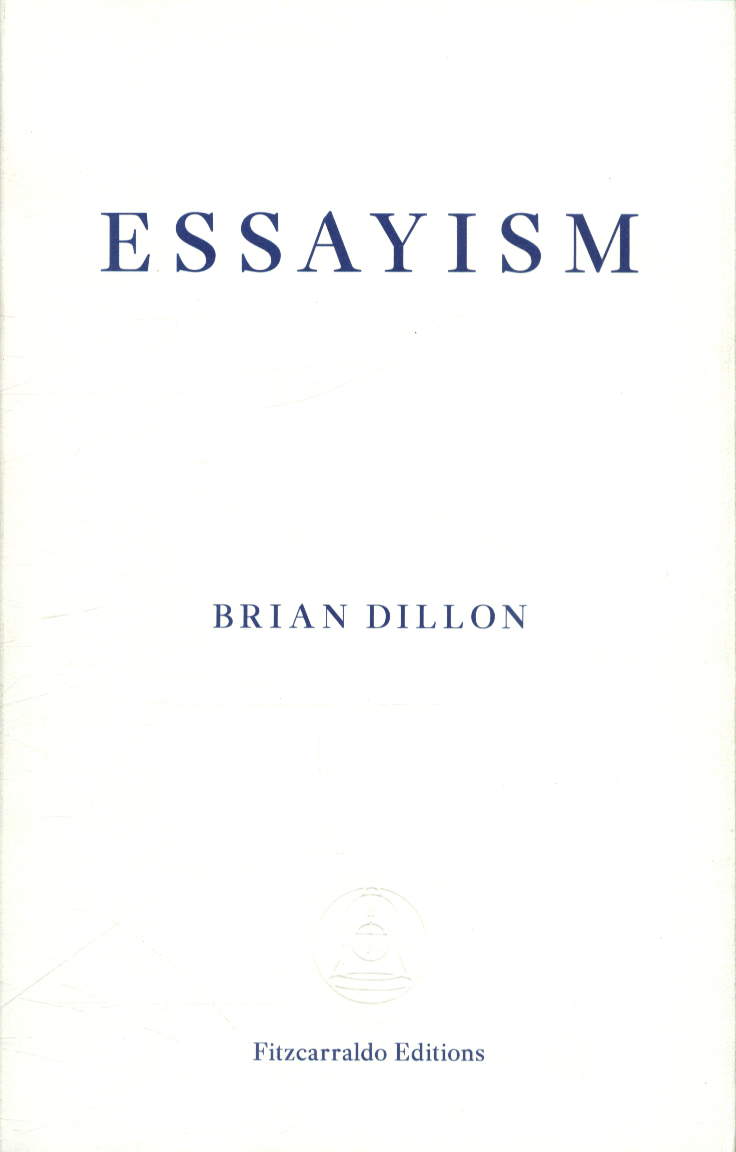Brian Dillon's Essayism

Confession: I have an aversion to the ultra plain-text book design used by Faber, Fitzcarraldo and co. I have a further wariness around certain litsnob cultures in London. So it took a few passes in bookshops before I picked up Dillon’s Essayism and actually bought it. (I was in a particularly spendthrifty mood, at the Cafe Oto Xmas Book and Record Fair, which burned my pockets out in time for Xmas.)
I also I found myself gravitating toward the idea of it. Essay-ism. The art (and fundaments?) of the essayist. I happened to be thinking about the essay and my problems with it, and thought it might actually help (it didn’t; my problems with essay writing are all of my own making.)
The opening piece is deliberately antagonistic. Read it as a list poem in lieu of a contents page and maybe you’ll forgive the aggressive show of style. Yet Dillon quickly lets you know he’s aware of the experiments and potential range within the form. List-making and parataxis represent just a sliver of the many opportunities afforded essayists and his approach is ambitious, attempting to both enact and reflect upon various forays, which allow him to expound his passion for essayists in his personal canon.
Importantly, for me, he doesn’t always demonstrate formal play while discussing it, so there’s a lovely irregularity to the form-content dichotomy. You might find a piece breaking into lists for no other reason than it suits the point in that particular essay. (Is there a better reason?) Elsewhere, he slakes his thirst by playing out the end of a piece in exactly the manner he is celebrating in another essayist. The lack of schematic, or rather, the organic organisation and range of play, enlivens.
There’s also more going on at the level of the whole book. Noticing his second use of the same essay title (‘On consolation’) sent me bouncing back and forth, looking for connections I’d not otherwise sought. By the third usage of the same title, you begin to suspect something marvellous happening at the unit of the book, which you might otherwise have been led to ignore.
It didn’t take me all that long – maybe thirty, fifty pages? – to trust Dillon’s language and arguments to take me anywhere they pleased. But the book shifts, subtly, to accommodate a further genre: a memoir about depression.
I want to say that it’s an honest, personal account of his depression, but the sentences are so neatly formed as to suggest a high degree of artifice, even selective curation. Like reading the highlights (yes, I know, inappropriate word for describing suicidal urges, but I use it deliberately) of a much greater suffering, one that’s impossible to describe. The book establishes that sense very keenly for me, which is in itself a reason to admire what’s happening.
There’s a point at which I began to take issue with Dillon’s arguments. The depression memoir intersects brilliantly with the ‘reading experiences’ genre (cf. R.B. Russell’s Fifty Forgotten Books and so on), along with Dillon’s meta-commentary on essay-writing. But his choice of influences caused me to baulk.
Dillon is very open about his influences: Palinurus’ The Unquiet Grave features heavily, which is a book I detest.[1] So too feature various Frankfurt School types – Adorno, Benjamin, etc. – with their extreme (and justifiable) hopelessness in humanism aestheticised into negativity. And Elizabeth Hardwick, whose sentences, no matter how perfectly poised, seem to me oversaturated with contempt.
That old problem of canonising and favourite-list-making thereby rears its head. Personally, I’d rather read the raw, malformed and rough language of the underskilled biting off more than they can chew than such skilled sentence-scientists excising their loathing upon the page with scalpel wits.
Many of Dillon’s influences, in short, seem to be utterly invested in despair, negativity and depression. Some, like Connolly, seem to reach expressive heights only when wallowing fully in a narcissistic bath of woe. Others, like Benjamin, produce their experiments in spite of the black dogs stalking them. And sure, I recognise a possible need to understand one’s own condition and to connect with writing and writers at the level of self-recognition, but I’ve increasingly found it hard to forgive the ideologically odious when delivered with panache.
Ultimately, I felt Essayism listing away (ha-ha) from all these influences. The book’s series of ‘consolations’ are so fully invested in memoir writing that they break form; Dillon’s style changes in these passages as he leaves his library and treats selfhood. I found myself rooting for him to recover, such as when he describes taking regular night walks to the sea to contemplate drowning himself, even though the outcome was given (the book’s in my hands to prove he’s not done it). There’s a real tension and empathy at work, knowing someone so capable and honest with language, so intellectually insightful, might find it impossible to take consolation from such skill.
And so my wariness dissolved, enough so that I’d say Dillon has invented his own version of the essay here. Not a personal essay, but a kind of memoir-essay-argument hybrid. The closest parallel in my reading history was in the latter end of David Shields’ Reality Hunger, where one chapter is a personal history collaged from other texts.
But there’s very little like Essayism,[2] particularly with regards such a modesty of style, let alone the deference Dillon shows to those writers who’ve led him to where he is. The language is exquisitely controlled, not to the degree of poise he celebrates in others, so much as the tempered weave he modulates to suit the points being made and the complex demands of a hybrid genre. That range of formal styles, as opposed to continuity, makes his writing less marketable, categorisable, but far more appealing to a reader like me.
As with the best serial projects, Essayism feels unfinishable. I can see more and more of Dillon’s writing unfolding into further temporary assemblages of books (and he already has three other collections with Fitzcarraldo, so I’m just late to the party).
Just as he describes being taken with Lester Bangs and other music journalists in his younger days, I can see collections of his critical writings working an influence on a certain kind of young intellectual. This is far more engaging, for me, than, say, Mark Fisher’s writing and I feel very much as if Essayism represents one of many calves this iceberg is ready to bear.[3] And consolation is a chronic need, not a one-shot project.
====
[1] The Unquiet Grave was such a hideous experience. Time and again I came up against an advanced grasp of experiment, of ecosocial relations, of complexity of perception, but one that was utterly self-interested. The extremes of Ayn Rand’s individualism buttressed against A Thousand Plateaus‘ wild embrace of post-totalitarian pluralism. Ultimately, it was Connolly’s loathing for women and, well, most of humanity, that lingered.
[2] Very little I’m aware of or can recall at time of writing, but a friend just sent me Paul Stanbridge’s My Mind to me A Kingdom Is, and I can see immediate parallels. Maybe also Kathleen Jamie’s Finding Trilogy, but that feels more embedded in the world than in the self, from what I remember of the little of the trilogy I’ve read.
[3] This is an awful metaphor, but I’m running out of energy for the finish.


